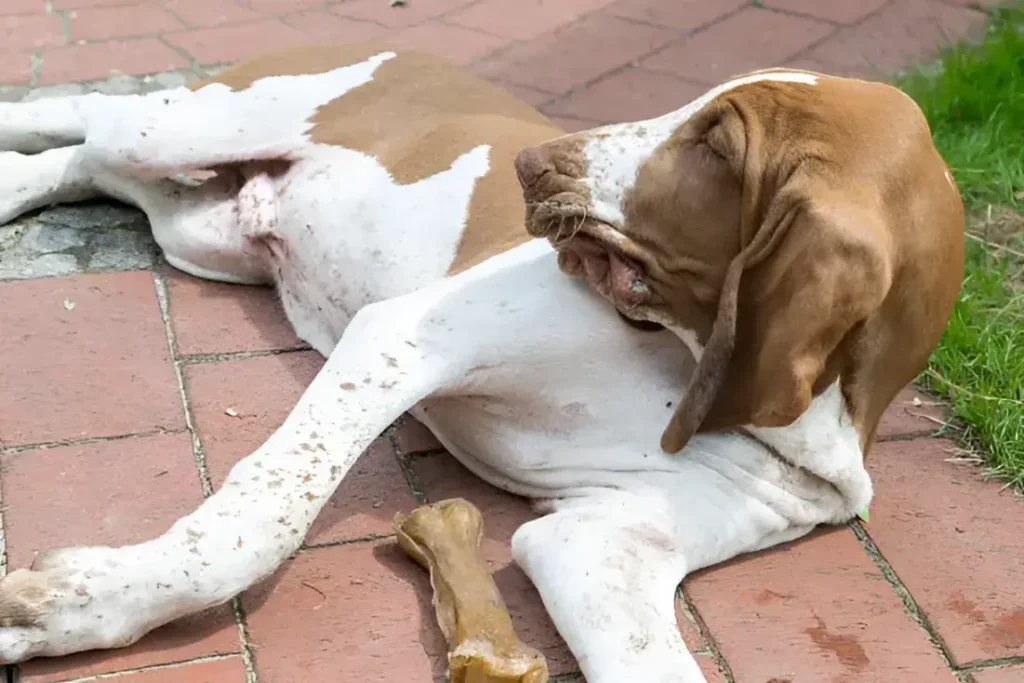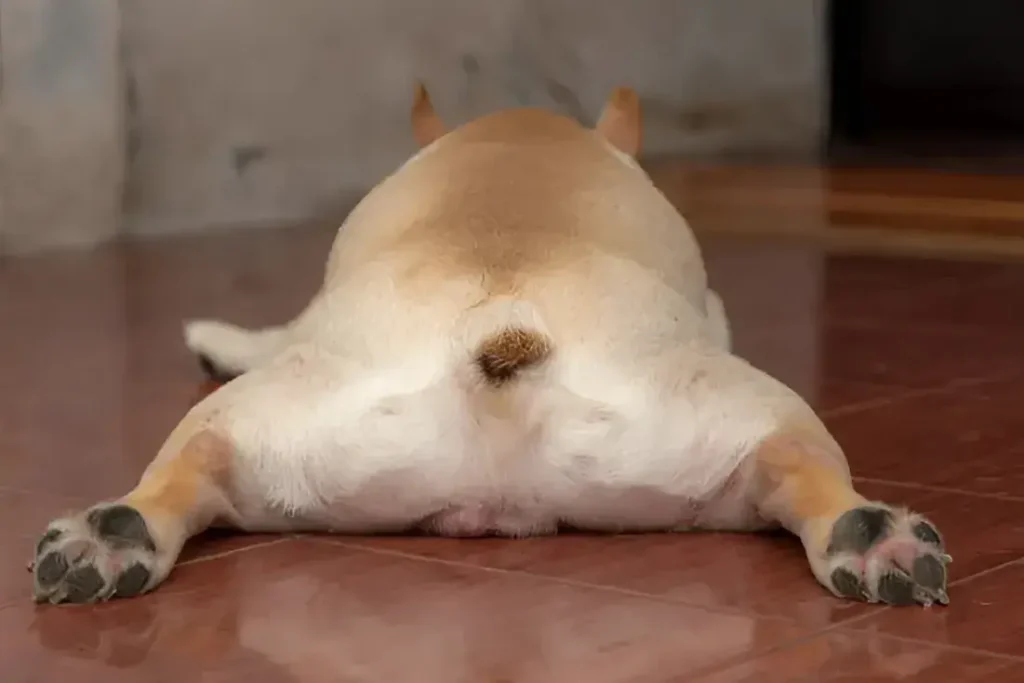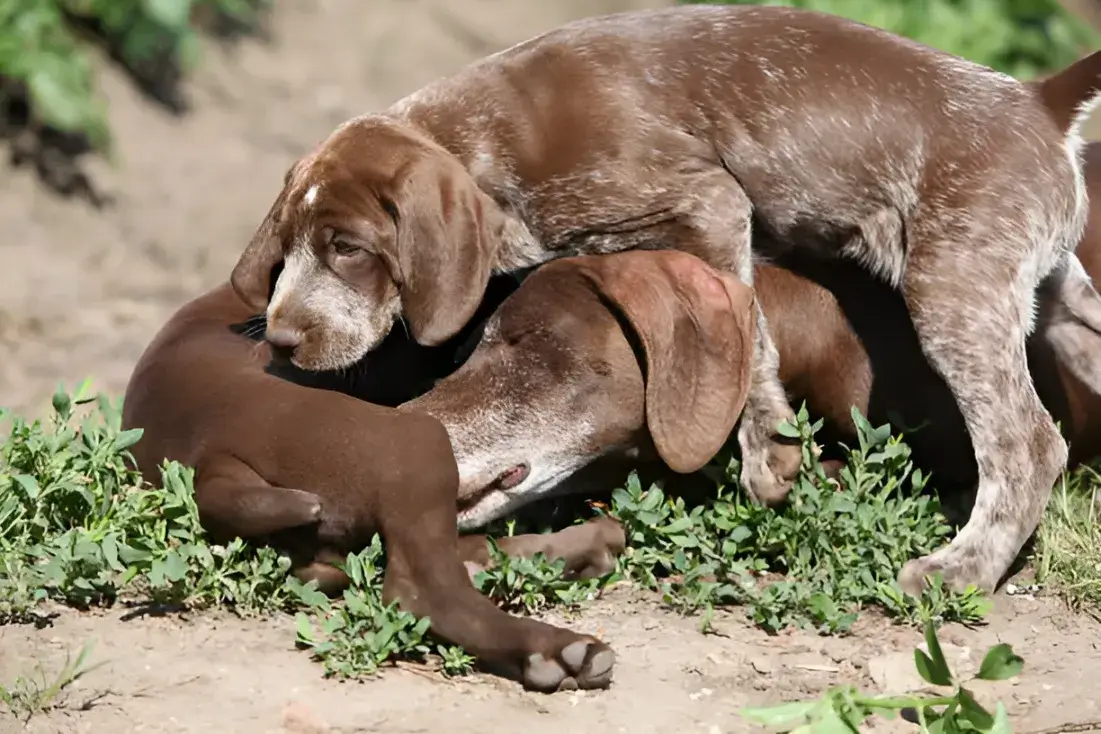Your dog’s constant licking of their private parts is a sign something’s not right. It could be a simple hygiene issue, but there’s often an underlying medical or behavioral condition that needs attention. Here’s how to get to the bottom of the problem and provide your dog with the relief they desperately need.
Understanding Normal vs. Excessive Licking
Dogs groom themselves, including occasionally giving their genital area a quick clean. However, if you notice your dog licking their private parts frequently, obsessively, or for extended periods, it’s time to intervene.
Step One: Rule Out Medical Issues
Many health problems can lead to excessive genital licking. Your veterinarian is your primary resource in helping you identify these underlying causes:
- Allergies: Common culprits are food sensitivities or environmental allergies causing itchy skin conditions.
- Urinary Tract Infections (UTIs): Discomfort during urination can lead to licking.
- Skin Injuries or Infections: Wounds, irritations, or yeast infections can all lead to licking to soothe discomfort.
- Anal Gland Problems: If the anal glands are impacted or infected, your dog may lick the general area in an attempt to address the pain.
Breed-Specific Considerations
While all dogs can experience excessive licking, some breeds might be more prone to certain conditions that contribute to the problem:
Short-Legged Breeds: Dachshunds, Basset Hounds, and other short-legged dogs have their bellies and private areas closer to the ground, making them more susceptible to picking up dirt, moisture, and allergens that can irritate the skin and trigger licking.
Breeds Prone to Allergies: West Highland White Terriers, Bulldogs, and Golden Retrievers are among the breeds predisposed to developing allergies that manifest in itchy skin and excessive licking.
Step Two: Address Behavioral Causes

If your veterinarian has ruled out any underlying medical issues, it’s time to consider behavioral reasons for your dog’s excessive licking:
- Boredom and Understimulation: When dogs lack sufficient mental and physical exercise, they may resort to repetitive behaviors like licking to occupy themselves.
- Anxiety and Stress: Anxious dogs may lick themselves as a way to self-soothe. Triggers could include separation anxiety, fear of loud noises, or disruptions to their daily routine.
Step Three: Management and Treatment
While addressing the underlying cause is crucial, take these steps to manage the licking in the meantime:
Cleaning Practices: Gently clean your dog’s genital area after elimination to prevent irritation and discomfort. Use warm water and a mild, dog-safe shampoo. Avoid harsh soaps or baby wipes, which can disrupt the natural balance of the skin.
Distraction: Engage your dog in activities like play, training, or puzzle toys to redirect their focus away from licking. Providing sufficient physical and mental stimulation can help reduce boredom and anxiety, lessening the urge to lick.
Temporary Deterrence: If unsupervised licking is severe, an Elizabethan collar (cone) can help prevent further irritation while you work on addressing the root cause. It’s important to note that cones should not be used as a long-term solution and can cause additional stress in some dogs.
Treatment Options
Your veterinarian will tailor their treatment recommendations based on the specific cause of your dog’s licking:
Allergies: Managing allergies might involve switching to a hypoallergenic food, using medicated shampoos, or prescribed allergy medications.
Medical Conditions: For UTIs, skin infections, or other health problems, medications, topical ointments, or other therapies may be necessary as directed by your vet.
Behavioral Concerns: Your veterinarian may suggest consulting a certified animal behaviorist. They can help address anxiety, boredom, or stress through desensitization, counterconditioning, and positive reinforcement techniques.
The Importance of Professional Help

Excessive genital licking is rarely a simple issue with a one-size-fits-all solution. Often, a multi-faceted approach is needed to address the root cause. Consulting your veterinarian is crucial, and depending on the situation, you might also benefit from collaborating with a veterinary dermatologist for specialized skin conditions, or a behaviorist for anxiety-related licking.
Signs of a Serious Issue
While licking is often a sign your dog is trying to address an irritation, it’s important to be alert for signs that indicate something more serious requiring immediate veterinary attention:
- Changes in Appearance: Redness, swelling, or any discharge from the genital area could signal an infection or injury that needs urgent treatment.
- Bleeding: Any bleeding warrants immediate evaluation by a veterinarian.
- Unusual Odor: A foul odor could indicate an underlying infection in need of medical treatment.
- Behavioral Changes: If your dog seems excessively painful, unusually lethargic, or is acting out of character, these signs along with the licking warrant an immediate vet visit.
The Emotional Toll
Constant licking can significantly impact both your dog’s quality of life and your own. Your dog may become withdrawn or frustrated, and you might feel helpless or stressed trying to manage the situation. Getting a correct diagnosis and tailored treatment plan is the crucial step to restoring everyone’s well-being.
Important Note: Home Remedies
It’s crucial to consult your veterinarian before attempting any home remedies for genital licking. Some well-intended solutions can actually worsen the problem, irritate your dog’s skin, or mask symptoms that require professional medical attention.
Conclusion
Excessive genital licking is rarely just a quirky habit; it’s often a sign of distress. By working with your vet to identify the root cause, following a tailored treatment plan, and managing the behavior while your dog heals, you can help them find relief and return to their happy, healthy self.
The photo featured below the post headline is Credit: Zuzule/istockphoto
I hope you find this post helpful and informative. If Yes’ feel free to share it with your friends!
Frequently Asked Question
Is it safe for my dog to use a topical cream to stop itching?
No, always consult your vet before using any topical treatment in the genital area. Many human or over-the-counter creams can be harmful to dogs if ingested or can further irritate sensitive skin.
My dog is licking excessively after being spayed/neutered. Is this normal?
Some licking is normal, but excessive licking might indicate a complication or infection at the incision site. Consult your veterinarian to be sure.
How long before I should see improvement once we start treating the underlying cause?
This can vary depending on the specific cause and the treatment involved. Some conditions may resolve quickly, while others may require ongoing management. Your veterinarian is the best resource to provide a timeline and what kind of improvement to expect.
How do I stop my dog from licking herself?
This question needs broader context. First, determine if it’s normal grooming or excessive licking. If excessive, addressing the underlying cause (medical or behavioral) is crucial. Temporary deterrents like a collar may be needed while you get the root problem under control.
Is my dog licking her private parts because she’s in heat?
While increased licking can occur during a heat cycle, it’s still important to rule out medical reasons.
My puppy keeps licking his privates. Is this normal?
Puppies explore their bodies, so some licking is expected. However, excessive licking in a puppy should still be investigated. Allergies and irritations can appear early in life.
Is it safe to use baby wipes to clean my dog’s privates?
No. Baby wipes often contain fragrances or chemicals that can disrupt a dog’s skin and lead to irritation. Stick to warm water and vet-recommended dog-safe cleanser if needed.
Is excessive licking a sign of a serious problem in dogs?
While not always, it can be. Redness, swelling, discharge, or behavioral changes paired with licking warrant immediate vet attention.
What can I do to prevent my dog from licking their privates excessively?
Prevention depends on the cause. Good hygiene, a diet tailored to allergies, enrichment to combat boredom, and stress management can all help.
My dog is excessively licking her privates after being in heat. Is this normal or a cause for concern?
While some licking after a heat cycle can be normal, excessive licking could signal a problem. It’s best to have your veterinarian check for any lingering infections, skin irritation, or other potential post-heat complications that might be causing discomfort.
My senior dog has started licking his privates obsessively. Could this be a sign of a cognitive issue?
While possible, there are several potential causes for this behavior in senior dogs. It’s important to first rule out medical issues like urinary tract infections, skin conditions, or arthritis pain that might be causing discomfort. If your vet finds no medical cause, then discussing potential cognitive decline and how to manage the behavior is the next step.

